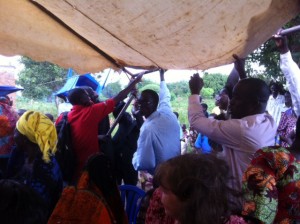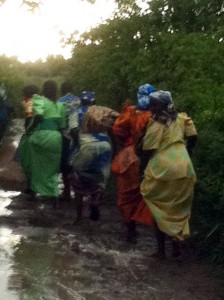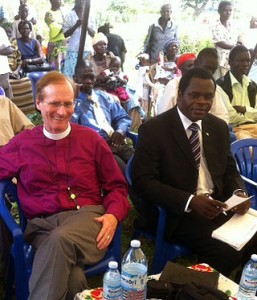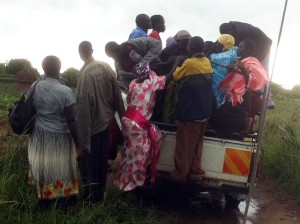 The worst road in northern Uganda may well be the road to Kumi. This road has been a disaster since before I came to Uganda. Over the last seven years it has been more or less in a constant state of reconstruction, and if anything, it has deteriorated. It really does put the route to Katakwi unequivocally in second place — potholes you could drown in, ruts the size of river beds, heavy traffic with massive, overloaded trucks headed mainly to southern Sudan. The road to Katakwi is just poor and neglected, but the road to Kumi has been made worse by years of government attention. According to Dr. Mwanika, “In Uganda, every man behind a desk is a problem.” So, here, corruption, poor planning, substandard construction, countless inefficiencies, turf wars, and the like add up to a traveler’s nightmare. Thank God for our driver, Francis, who manages to get us past the bad section in little more than an hour.
The worst road in northern Uganda may well be the road to Kumi. This road has been a disaster since before I came to Uganda. Over the last seven years it has been more or less in a constant state of reconstruction, and if anything, it has deteriorated. It really does put the route to Katakwi unequivocally in second place — potholes you could drown in, ruts the size of river beds, heavy traffic with massive, overloaded trucks headed mainly to southern Sudan. The road to Katakwi is just poor and neglected, but the road to Kumi has been made worse by years of government attention. According to Dr. Mwanika, “In Uganda, every man behind a desk is a problem.” So, here, corruption, poor planning, substandard construction, countless inefficiencies, turf wars, and the like add up to a traveler’s nightmare. Thank God for our driver, Francis, who manages to get us past the bad section in little more than an hour.
At Mukura, we turn off the main Kumi road and head up into the little village where the wedding will take place. Mukura is on the old rail line built by the British and was the site of a terrible atrocity in 1987. Yoweri Museveni, was busy consolidating his power in the Northeast following the war that won him the presidency of Uganda. Teso as a region was considered a defeated enemy, and the army moved harshly against suspected rebels. In this case, they rounded up many dozens of people they thought might cause trouble, mainly young men. They were accused of “rebel activity” and herded into cattle cars on a siding near the station. Then the soldiers put stacks of wood under the cars, doused them with gasoline, and set them ablaze. The captive young people were burned alive. Over a hundred died. The commander responsible for this atrocity later died in Rwanda, but the people here have never forgotten his name.
We pick up Pastor Wilson and head to the wedding site in a clearing near a huge mango tree. Many of the guests are already there, and there are long tents on two sides protecting the in-laws from the sun. Pastor and I sit down to work out the order of service, while choirs from the village churches take their turns singing spirituals and hymns.
Pastor Wilson has asked my help, not only as an honor for me, but also to celebrate Pilgrim Africa’s work in the region. Wilson has huge standing as a spiritual leader in Teso, and though he is a Pentecostal, he is intrigued by the Book of Common Prayer (especially the American version) and wants me both to preach and to conduct the entire service from it.
 This poses a couple of problems. I managed to get in touch this morning with the Church of Uganda Bishop of Kumi, so he wouldn’t first find out about a wandering American bishop in tomorrow’s newspaper. Bishop Irigei could not have been more gracious and gave me carte blanche. But it is clear that I don’t have any civil authority to do any marrying in Uganda; so I tell Pastor that I can really do only the instruction and declaration of consent. The couples can take their vows, then he will have to manage everything else, using words, shall we say, inspired by the Book of Common Prayer. He nods enthusiastically.
This poses a couple of problems. I managed to get in touch this morning with the Church of Uganda Bishop of Kumi, so he wouldn’t first find out about a wandering American bishop in tomorrow’s newspaper. Bishop Irigei could not have been more gracious and gave me carte blanche. But it is clear that I don’t have any civil authority to do any marrying in Uganda; so I tell Pastor that I can really do only the instruction and declaration of consent. The couples can take their vows, then he will have to manage everything else, using words, shall we say, inspired by the Book of Common Prayer. He nods enthusiastically.
The grooms arrive first, stepping very slowly and in a stately fashion, together with their best men, to the singing of the choirs. They are seated, and within a few minutes the brides arrive.
 Just as in an American wedding, this is the moment everyone is waiting for. They pile out of the cars with their entourage, greeted by the high-pitched trilling of the women of the community. They come in similar fashion to the men, led by the cutest flower girls on the planet, and are seated in a separate section next to the grooms.
Just as in an American wedding, this is the moment everyone is waiting for. They pile out of the cars with their entourage, greeted by the high-pitched trilling of the women of the community. They come in similar fashion to the men, led by the cutest flower girls on the planet, and are seated in a separate section next to the grooms.
And this is the point at which the emcee of the wedding makes a serious mistake. In spite of the darkening skies, he does not adjust the program. Instead, he allows the village choirs to continue, one after another, with their musical offerings in honor of the couples. By the time we get to the moment of the actual wedding, we are overshadowed by a skyful of black clouds.
It is surprising how long the instruction and declaration of consent can take, when you’ve got eight couples, and have to do this with a phrase-by-phrase translation into Ateso. The consent, obviously, has to be ascertained one couple at a time, and after the first two responses (“ebo” meaning “I will”), the brides and grooms start padding their lines (e.g. “I will, and as God is my witness, he will be my first and last!”). After each of these little affirmations the crowd goes wild, which helps to explain why we only get through six couples before the heavens open.
Rain in Teso is no quiet affair. What doesn’t come down in sheets, comes down in buckets. Everybody heads for the tents into which we are packed like sardines. I can safely say I have never looked a couple more eyeball-to-eyeball than I do with these last two. The whole thing feels like marrying sixteen people in an elevator while being sprayed with a fire hose. We manage to get it all done. Pastor Wilson is, in fact, inspired. Rain at a wedding is considered a special blessing, so in spite of some grumbling about the emcee’s poor judgment, everyone is in remarkably good humor. Until the tents start to blow away.

When the first one collapses, there is mainly a lot of confusion, laughter and scurrying for alternate cover. The second, the one we’re in, is set on steel posts with a steel frame. It lifts suddenly off the ground, like Dorothy’s house in the Wizard of Oz, the rear of the frame pulling out of the supports in a nanosecond. By the grace of God, about a dozen young men react instantly, grabbing the frame and holding onto it until it can be re-secured, avoiding what almost certainly would have been some serious injuries. After about a half-hour, the rain subsides, the cake is cut, some pictures are taken, but most people just start heading home. The feast will have to happen another day.
 On the way back to Soroti, there is a lot of laughter and commentary in the car. My favorite remark: “Well, the parents of any girls ought to be happy. They won’t be tortured for weeks by their daughters saying, “Daddy I want my wedding to be just like that one!”
On the way back to Soroti, there is a lot of laughter and commentary in the car. My favorite remark: “Well, the parents of any girls ought to be happy. They won’t be tortured for weeks by their daughters saying, “Daddy I want my wedding to be just like that one!”


